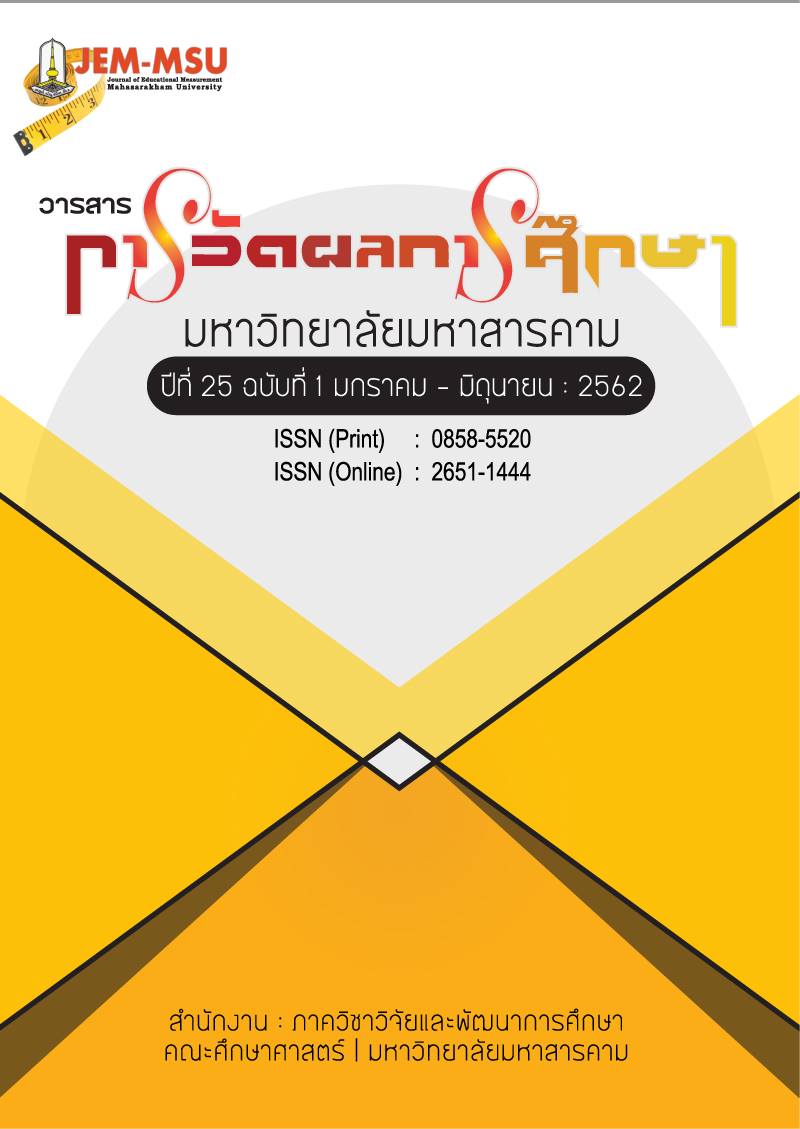Development of Work Competency Indicators of School General Service Officers in the Northeast
Main Article Content
Abstract
The objectives of this study were to develop the indicators and to examine the construct validity of the work competency indicators of general service officers in schools in the Northeast. The sample consisted of 408 general service officers from primary schools in 8 provinces in the Northeast, obtained through two–stage cluster sampling. The instrument for collecting empirical data was a 5-point rating scale close-end questionnaire containing 54 questions with the value of discrimination (rxy) from 0.56 to 0.92, and the value of the total reliability of 0.99. The statistic employed in this study was confirmatory factor analysis.
The results revealed that:
1. The work competency indicators of general service officers in primary schools in the Northeast consisted of 3 aspects with 10 primary indicators and 54 secondary indicators. The competency was divided into core competency, job competency and individual competency. The core competency had 5 primary indicators and 20 secondary indicators while the job competency had 2 primary indicators and 13 secondary indicators, and the individual competency had 3 primary indicators and 21 secondary indicators.
2. The analysis for examination of consistency and harmony of the theoretical structured model and the empirical data found that the structured model was consistent and harmonized with the empirical data. The components which had the most weight of significance in indicating work competency of general service officers were the job competency, individual competency, and core competency, with the weight of 0.965, 0.831, and 0.615 respectively. The root mean square error of approximation between the model and empirical data had the value of Chi-square = 0.639, the value of probability = 0.8874 at the degree of freedom (df) = 3, the value of CFI = 1.000, the value of TLI = 1.011, the value of SRMR =0.005 and the value of RMSEA = 0.000. In conclusion, the results revealed that the model had construct validity.
Article Details
The content and information contained in the published article in the Journal of Educational Measurement Mahasarakham University represent the opinions and responsibilities of the authors directly. The editorial board of the journal is not necessarily in agreement with or responsible for any of the content.
The articles, data, content, images, etc. that have been published in the Journal of Educational Measurement Mahasarakham University are copyrighted by the journal. If any individual or organization wishes to reproduce or perform any actions involving the entirety or any part of the content, they must obtain written permission from the Journal of Educational Measurement Mahasarakham University.
References
เจริญวิชญ์ สมพงษ์ธรรม. (2553). การพัฒนาสมรรถนะการปฏิบัติงาน: สมรรถนะหลัก (Core Competency). ชลบุรี : มหาวิทยาลัยบูรพา.
จักรกฤษณ์ สนอ่อง. (2555). คู่มือการปฏิบัติ งานธุรการ (ปรับปรุง พ.ศ. 2555). สำนักงานสภามหาวิทยาลัยนเรศวร.
ณรงวิทย์ แสนทอง. (2547). มารู้จัก COMPETENCY กันเถอะ. กรุงเทพฯ : เอช อาร์ เซ็นเตอร์.
ดนัย เทียนพุฒ และคณะ. (2541). ทิศทางและบทบาทการบริหารทรัพยากรบุคคลในทศวรรษหน้า (ปี พ.ศ.2550). กรุงเทพฯ : สมาคมการจัดการงานบุคคลแห่งประเทศไทย.
นงลักษณ์ วิรัชชัย. (2542). ความสัมพันธ์เชิงโครงสร้างเส้น (LISREL) สถิติวิเคราะห์สำหรับการวิจัยทางสังคมศาสตร์ และพฤติกรรมศาสตร์. กรุงเทพฯ : จุฬาลงกรณ์มหาวิทยาลัย.
บุญชู แก้ชมพู. (2539). การบริหารงานธุรการ การเงิน และพัสดุ. พระนครศรีอยุธยา : สถาบันราชภัฏพระนครศรีอยุธยา.
ประดิษฐ์ ฮวบเจริญ. (2545). สอบเลื่อนตำแหน่งผู้บริหาร. กรุงเทพฯ : อักษรพิพัฒน์.
สำนักงานคณะกรรมการข้าราชการพลเรือน. (2558). การพัฒนาระบบสมรรถนะ. [ออนไลน์]. ได้จาก http://www.ocsc.go.th/ocsc/th/index.php?option=com_content&view=article&id=258&Itemid=252 [สืบค้นเมื่อ 29 ตุลาคม 2558].
สำนักงานคณะกรรมการข้าราชการพลเรือน. (2553). การปรับใช้สมรรถนะในการบริหารทรัพยากรมนุษย์. [ออนไลน์]. ได้จาก http://www.ocsc.go.th/ocsc/th/uploads/File/competency.pdf [สืบค้นเมื่อ 29 ตุลาคม 2558].
สำนักพัฒนาระบบบริหารงานบุคคลและนิติการ. (2552). คู่มือการฝึกอบรมหลักสูตรงานธุรการในสถานศึกษา. กรุงเทพฯ : ริมปิงการพิมพ์.
สุกัญญา รัศมีธรรมโชติ. (2547). Competency เครื่องมือการบริหารที่ปฏิเสธไม่ได้, โปรดักทิวิตี้ เวิลด์, 9(53), 44-51.
Linn H.H.. (1956). School business Administration. New York: The Ronald Press.


